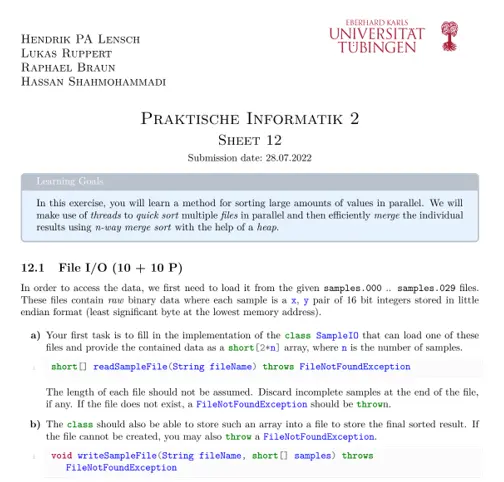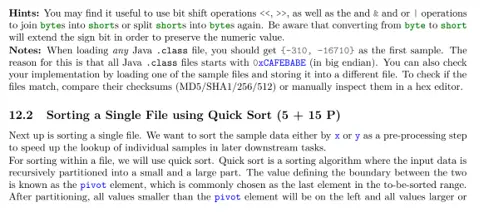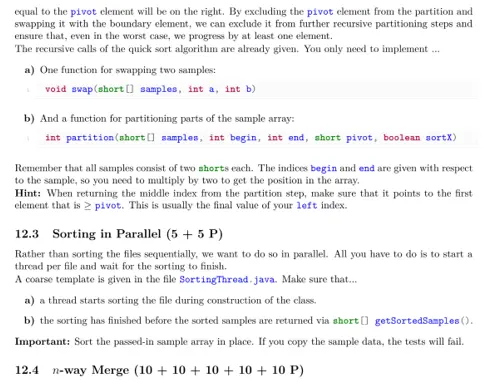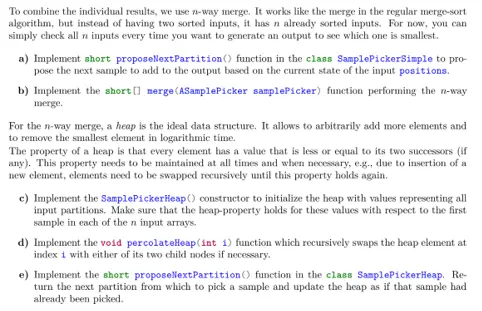Instructions
Objective
Write a java homework to work with binary data, file IO and sorting techniques.
Requirements and Specifications





Source Code
NWAY MERGE
package submission;
import java.util.ArrayList;
import java.util.Arrays;
import java.util.Comparator;
import java.util.List;
public class NWayMerge {
private final short[][] individuallySortedSamples;
private final boolean sortX;
private final int totalNumSamples;
NWayMerge(short[][] individuallySortedSamples, boolean sortX) {
this.individuallySortedSamples = individuallySortedSamples;
this.sortX = sortX;
int totalNumSamples = 0;
for (int i=0; i
totalNumSamples += individuallySortedSamples[i].length;
}
// every sample consists of two values
this.totalNumSamples = totalNumSamples/2;
}
abstract class ASamplePicker {
// current position in each of the input arrays
protected int[] positions = new int[individuallySortedSamples.length];
// returns the index of the partition with the smallest sample at the current position
abstract short proposeNextPartition();
// get the current sample position and advance it by one
int getNextSamplePositionFromPartition(short partition) {
return positions[partition]++;
}
}
class SamplePickerSimple extends ASamplePicker {
short proposeNextPartition() {
short minPart = -1;
short value = Short.MAX_VALUE;
for(short i = 0; i < individuallySortedSamples.length; i++) {
if (individuallySortedSamples[i].length <= 2*positions[i]) {
continue;
}
if (individuallySortedSamples[i][2*positions[i] + (sortX ? 0 : 1)] < value) {
value = individuallySortedSamples[i][2*positions[i] + (sortX ? 0 : 1)];
minPart = i;
}
}
return minPart;
}
}
class SamplePickerHeap extends ASamplePicker {
private short[] heap;
private int heapSize = 0;
SamplePickerHeap() {
heap = new short[individuallySortedSamples.length];
List shorts = new ArrayList<>();
for (short i = 0; i
shorts.add(i);
}
shorts.sort(Comparator.comparingInt(o -> individuallySortedSamples[o][sortX ? 0 : 1]));
for(short i = 0; i
heap[i] = shorts.get(i);
heapSize++;
}
}
void percolateHeap(int i) {
int child = 2*i+1;
if (child < heapSize) {
if (child + 1 < heapSize && individuallySortedSamples[heap[child]][2*positions[heap[child]] + (sortX ?
0 : 1)]
> individuallySortedSamples[heap[child+1]][2*positions[heap[child+1]] + (sortX ? 0 : 1)]) {
child++;
}
if (individuallySortedSamples[heap[i]][2*positions[heap[i]] + (sortX ? 0 : 1)]
> individuallySortedSamples[heap[child]][2*positions[heap[child]] + (sortX ? 0 : 1)]) {
short sw = heap[i];
heap[i] = heap[child];
heap[child] = sw;
percolateHeap(child);
}
}
}
short proposeNextPartition() {
short minPart = heap[0];
if (2*positions[minPart] + 2 >= individuallySortedSamples[minPart].length) {
heap[0] = heap[heapSize-1];
heapSize--;
}
positions[minPart]++;
percolateHeap(0);
positions[minPart]--;
return minPart;
}
}
private short[] merge(ASamplePicker samplePicker) {
short[] result = new short[2*totalNumSamples];
for (int i = 0; i
short j = samplePicker.proposeNextPartition();
int pos = samplePicker.getNextSamplePositionFromPartition(j);
result[2*i] = individuallySortedSamples[j][2*pos];
result[2*i+1] = individuallySortedSamples[j][2*pos + 1];
}
return result;
}
short[] simpleMerge() {
return merge(new SamplePickerSimple());
}
short[] heapMerge() {
return merge(new SamplePickerHeap());
}
}
QUICK SORT
package submission;
import java.util.Random;
public class
QuickSort {
static int partition(short[] samples, int begin, int end, short pivot, boolean sortX) {
// TODO: partition the sample data either by the x or the y coordinates based on the pivot value
// NOTE: all samples consist of two values and the begin and end indices are given with respect to the sample, not the array position
int i = begin-1;
for (int j = begin; j <= end; j++) {
if (sortX && samples[2*j] < pivot || !sortX && samples[2*j + 1] < pivot) {
i++;
swap(samples, i, j);
}
}
return i+1;
// return -1; // FIXME: replace this with something useful
}
private static void swap(short[] samples, int a, int b) {
// TODO: swap the samples stored at indices a and b
// NOTE: all samples consist of two values and the a and b indices are given with respect to the sample, not the array position
short s1 = samples[2*a];
short s2 = samples[2*a+1];
samples[2*a] = samples[2*b];
samples[2*a+1] = samples[2*b+1];
samples[2*b] = s1;
samples[2*b+1] = s2;
}
static void sort(short[] samples, int begin, int end, boolean sortX) {
if (end <= begin)
return;
final int middle = partition(samples, begin, end-1, samples[2*end+(sortX ? 0 : 1)], sortX);
swap(samples, middle, end);
sort(samples, begin, middle-1, sortX);
sort(samples, middle+1, end, sortX);
}
}
Similar Samples
Explore our diverse portfolio of programming homework samples at ProgrammingHomeworkHelp.com. Whether you need assistance with Java, Python, Machine Learning, or Data Structures, our examples demonstrate our expertise and dedication to delivering high-quality solutions. Each sample is crafted to help you understand complex concepts and excel in your programming assignments. Discover how our samples can guide you towards academic success.
Java
Java
Java
Java
Java
Java
Java
Java
Java
Java
Java
Java
Java
Java
Java
Java
Java
Java
Java
Java
